*Disclaimer: This policy is effective November 3, 2025. For policy prior to such date, please visit here*
Terms and Definitions
Earliest Return Date (ERD) - This represents the first available date to return the container, as provided by the ocean terminals.
Demurrage Terminal Guide available here: https://us.one-line.com/DemurrageTerminalGuide
Rail Receiving Date (RRD) - This applies to outbound containers requiring rail transport and is the first date the container may be tendered at an inland rail location.
Container Availability Date (CAD) - This is set by the ocean terminal and is the first date a discharged inbound container is available for pickup.
Tariff Rule for Free Time at Origin - US West Coast & US East Coast
Freetime Policy:
- For shipments carried to and from the U.S.A. under ONE’s tariff terms for demurrage and detention, ONE will only calculate free day usage when the pick-up or return facility(s) gate(s) is/are open for the cargo and equipment pick-up and return.
Demurrage Policy:
Exports
- The demurrage clock commences the day after the cargo has been received at load ports and intermodal locations and ends on the day of the scheduled vessel berthing at the load ports.
- A customer will only be assessed for the demurrage charge at the ocean terminals and the intermodal locations for each calendar day after the expiry of freetime under the following scenarios and when the gated container stay exceeds the agreed free time.
- When a customer requests or causes a roll after gating in the container.
- When a roll is caused by a regulatory reason, including, but not limited to, action caused by or related to the U.S. Customs, Food and Drug Administration, United States Department of Agriculture, or any government or regulatory entity, agency, law, or rule.
- When the full laden container is received at an ocean terminal prior to the terminal's Earliest Receiving Date (ERD) or at an intermodal location prior to the ONE’s RRD.
- ONE will not charge the time incurred when the cargo is unable to load a vessel due to overbooked vessels resulting in ONE rolling the booking or if the vessel is canceled/delayed.
- ONE will not charge the time incurred when the container is unable to load a vessel due to a rail or intermodal delay caused by ONE or an ONE-hired vendor resulting in ONE rolling the booking.
- Outbound demurrage policy applies equally to merchant and carrier haulage.
Imports
- The demurrage clock commences on the first full day when the container(s) is available for pick-up after vessel discharge.
- Demurrage charges are incurred for containers stored on terminals after the end of the freetime period defined by tariff or service contract.
- Specifically, for shipments being carried to the U.S.A. under ONE’s tariff terms for demurrage, demurrage charges will be assessed only on days when the pick-up facility gate is open for cargo pick-up for California only. For all other locations, ONE will assess demurrage charges on a calendar day basis once freetime has expired.
- A customer will be assessed for the demurrage charge at the ocean terminals when the delay is caused by a regulatory reason, including, but not limited to, action caused by or related to the U.S. Customs & Border Protection, Food and Drug Administration, United States Department of Agriculture, or any government or regulatory entity, agency, law, or rule.
- Inbound demurrage policy applies equally to merchant and carrier haulage.
Detention Policy:
Exports
- Detention clock commences upon empty container outgate.
- Detention charges are incurred for containers held after the end of freetime period defined by tariff or service contract.
- Specifically for the shipments being carried from the U.S.A. under ONE’s tariff terms for detention, detention charges will be assessed only on days when the return facility gate is open for the laden container gate-in for California only. For
all other locations, ONE will assess detention charges on a calendar basis once free time has expired.
- Extended-period detention due to changes in the ocean terminal ERD or ONE's RRD after the empty container outgate will not be charged.
- Outbound detention policy applies equally to merchant and carrier haulage.
Imports
- Detention clock commences upon laden container outgate at ocean terminals or intermodal locations.
- Detention charges are incurred for containers held outside freetime period defined by tariff or service contract.
- Specifically, for the shipments being carried to the U.S.A. under ONE’s tariff terms for detention, detention charges will be assessed only on days when the return facility gate is open for empty returns for California only. For all other locations, ONE will assess detention charges on a calendar day basis once freetime has expired.
- When a container yard (CY) delivery container is undergoing customs examination outside of ocean terminals or intermodal locations, it shall not be subject to detention per diem charges during the examination period. The detention per diem charge shall start immediately after the container is gated out from the customs examination facility.
- Inbound detention policy applies equally to merchant and carrier haulage.
*Disclaimer: This policy is effective November 3, 2025. For policy prior to such date, please visit here*
*Disclaimer: This policy is effective November 3, 2025. For policy prior to such date, please visit here*
Billing Rules
The following table outlines the default payer for equipment demurrage and detention.*
*ONE will review exception requests on a case-by-case basis.
Demurrage
- Import container yard (CY) charges and door moves are invoiced to the US customer of record (consignee on US Imports).
- Charges for export container yard (CY) and door moves are invoiced to the contract party.
Detention
- Import container yard (CY) charges and door moves are invoiced to the US customer of record (consignee on US Imports).
- Charges for export container yard (CY) and door moves are invoiced to the contract party.
*Disclaimer: This policy is effective November 3, 2025. For policy prior to such date, please visit here*
*Disclaimer: This policy is effective November 3, 2025. For policy prior to such date, please visit here*
Invoice Information
The following examples are intended to clarify changes to ONE’s detention and demurrage billing practices. The invoices provided are for informational purposes only, and actual invoice terms may vary.
DTIC - Import Detention Invoice:
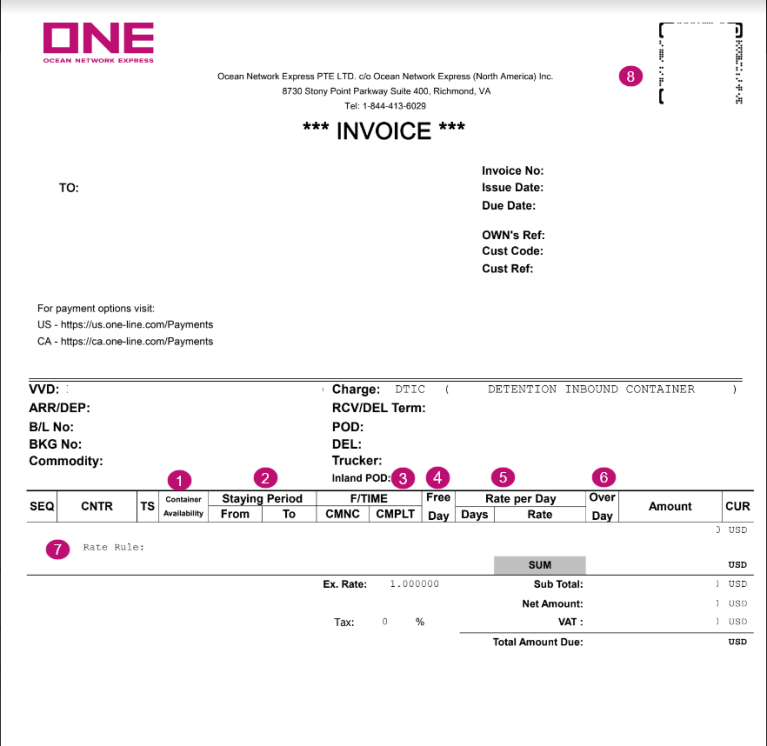
Field Information
- Container Availability: Date the terminal advises the container is available for pickup
- Staying Period: Date range from Container Outgate Date through Empty Container Return Date.
- F/TIME: Non-billable days between Container Outgate Date and Last Free Day Date
- Free Day: Number of Non-billable days
- Rate per Day: Daily billable charge
- Over Day: Number of billable days
- Rate rule: Identifies the applicable freetime and/or rate rule.
- QR Code: Scan the QR Code using the photo app on a cell phone to be directed to ONE’s Demurrage & Detention webpage
DMIF Import Demurrage Invoice:
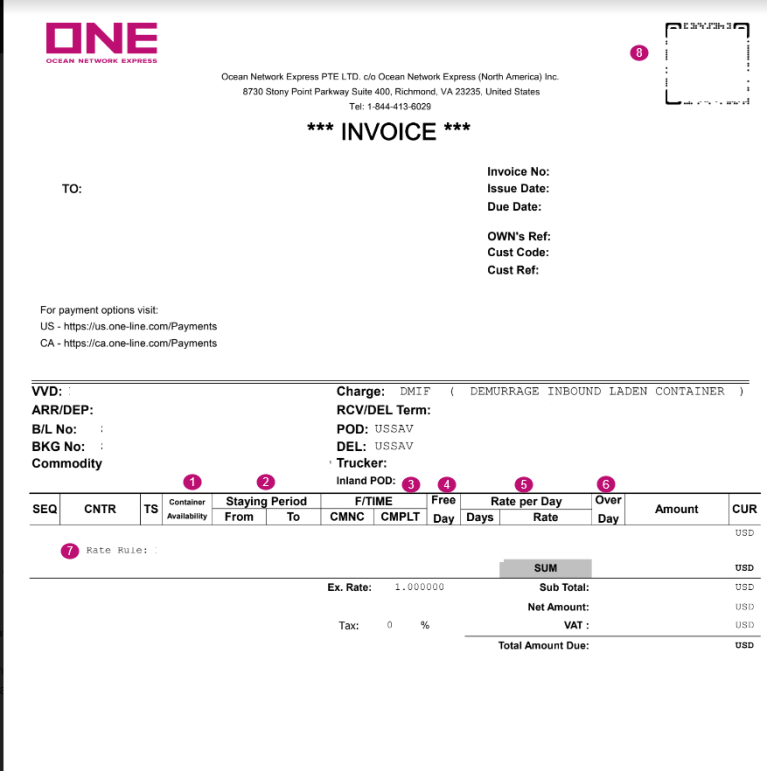
Field Information
- Container Availability: Date the terminal advises the container is available for pickup
- Staying Period: Date range from Container Availability Date through Container Outgate Date
- F/TIME: Non-billable days between Container Availability Date and Last Free Day Date
- Free Day: Number of Non-billable days
- Rate per Day: Daily billable charge
- Over Day: Number of billable days
- Rate rule: Identifies the applicable freetime and/or rate rule.
- QR Code: Scan the QR Code using the photo app on a cell phone to be directed to ONE’s Demurrage & Detention webpage
DTOC Export Detention Invoice:
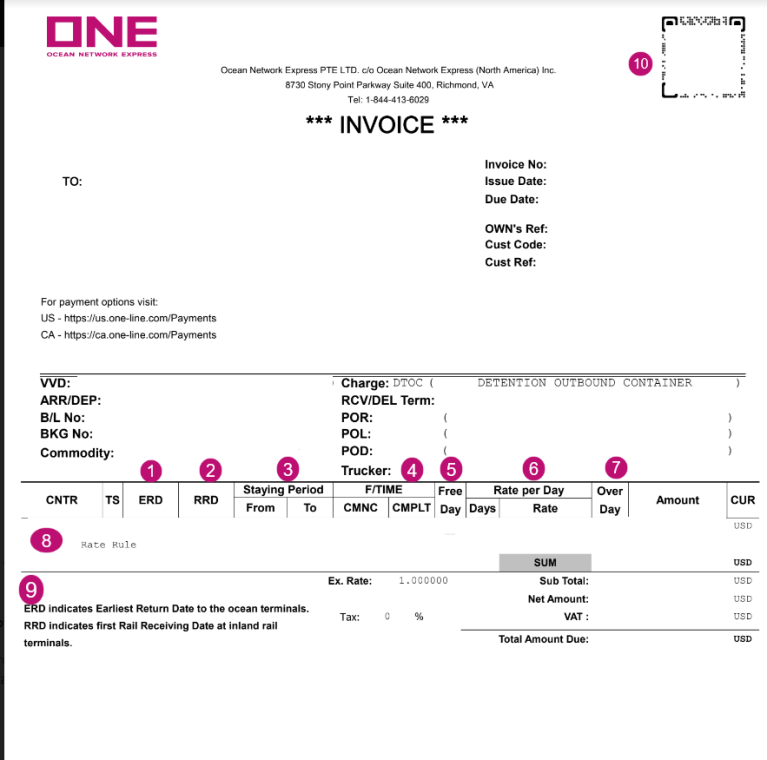
Field Information
- ERD: Early Return Date - the first day a laden export container may ingate (ocean terminal)
- RRD: Rail Return Date - the first day a laden export container may ingate (rail terminal)
- Staying Period: Date range from Empty Container Outgate Date through Full Container Ingate Date
- F/TIME: Non-billable days between Empty Container Outgate Date and Last Free Day Date
- Free day: Number of Non-billable days
- Rate per Day: Daily billable charge
- Over Day: Number of billable days
- Rate rule: Identifies the applicable freetime and/or rate rule
- ERD/RRD Definitions: Explains ONEs definitions of these 2 acronyms.
- QR Code: Scan the QR Code using the photo app on a cell phone to be directed to ONE’s Demurrage & Detention webpage
DMOF Export Demurrage Invoice:
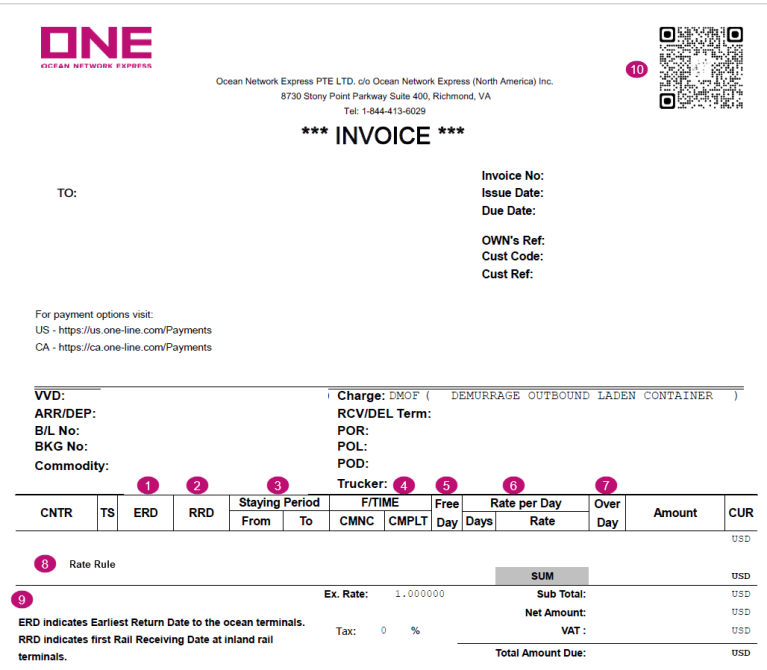
Field Information
- ERD: Early Return Date - the first day a laden export container may ingate (ocean terminal)
- RRD: Rail Return Date - the first day a laden export container may ingate (rail terminal)
- Staying Period: Date range from Ocean Terminal Interchange Date through Vessel Load Date
- F/TIME: Non-billable days between Ocean Terminal Interchange Date and Last Free Day Date
- Free day: Number of Non-billable days
- Rate per Day: Daily billable charge
- Over Day: Number of billable days
- Rate rule: Identifies the applicable freetime and/or rate rule
- ERD/RRD Definitions: Explains ONEs definitions of these 2 acronyms.
- QR Code: Scan the QR Code using the photo app on a cell phone to be directed to ONE’s Demurrage & Detention webpage
CTIC Import Combined Detention Invoice:
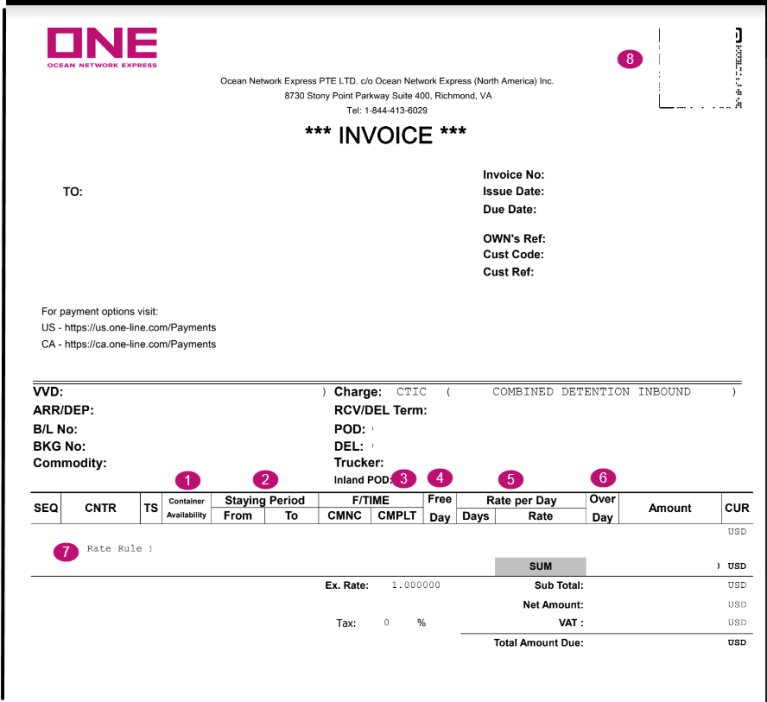
Field Information
- Container Availability: Date the terminal advises the container is available for pickup
- Staying Period: Date range from Container Availability Date through Empty Container Return Date
- F/TIME: Non-billable days between Container Availability Date and Last Free Day Date
- Free day: Number of Non-billable days
- Rate per Day: Daily billable charge
- Over Day: Number of billable days
- Rate rule: Identifies the applicable freetime and/or rate rule
- QR Code: Scan the QR Code using the photo app on a cell phone to be directed to ONE’s Demurrage & Detention webpage
Sample Rider Documentation:
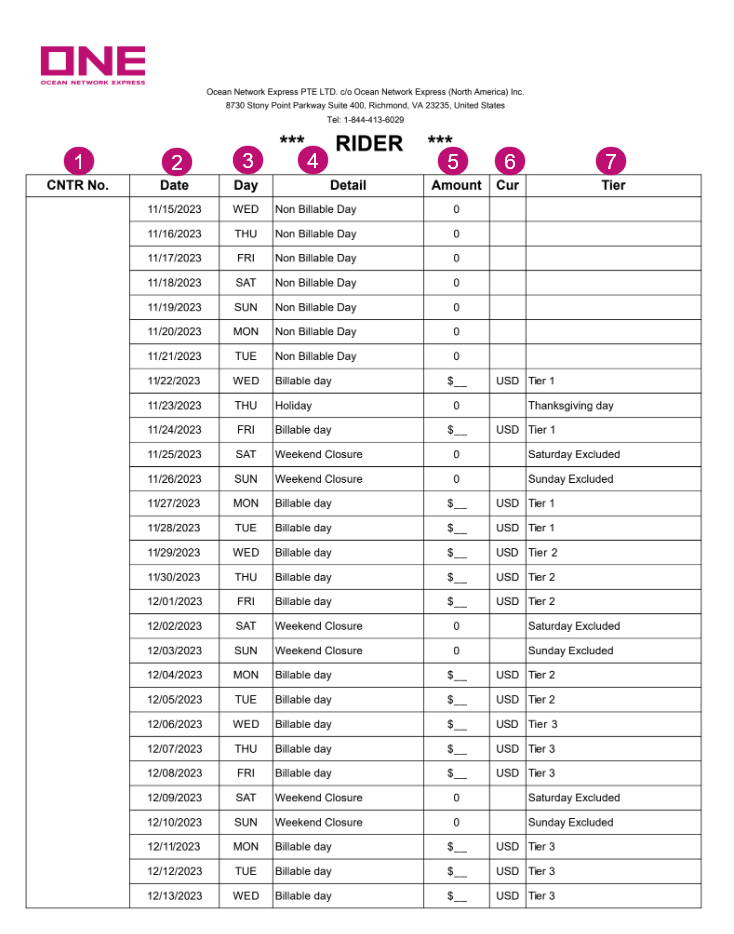
Field Information for RIDER
- CNTR No.: Container Number
- Date: List of all dates between Staying Period From Date and Staying Period To Date
- Day: Day of the week
- Detail: Identifies if a specified date is billable or non billable
- Amount: Daily billable rate
- Cur: Currency for the billable charges
- Tier: Identifies the charge Tier
*Disclaimer: This policy is effective November 3, 2025. For policy prior to such date, please visit here*
*Disclaimer: This policy is effective November 3, 2025. For policy prior to such date, please visit here*
Inquiries and Disputes
Please direct demurrage and detention billing inquiries and invoice disputes to the following:
Inquiries - [email protected]
Inquiries may include:
- Request for a statement
- Invoice copy request
- Cash application inquiries
- Any non-dispute billing question
If you do wish to dispute a Demurrage or Detention invoice, you may do so by accessing the Demurrage & Detention Dispute Form which can be found at the bottom of the following webpage: ONE North America Demurrage and Detention Invoice Disputes
*Disclaimer: This policy is effective November 3, 2025. For policy prior to such date, please visit here*
Demurrage & Detention Calculation Logic Update FAQ
Demurrage & Detention Calculation Logic Update FAQ
(effective from 6/1/2023)
Q1. How does ONE calculate Demurrage and Detention charges when the terminal partially closes the gate (e.g. the first shift is open but the second shift is not open)?
A1. Demurrage and Detention are charged by ONE unless the terminal or facility is completely closed and inaccessible. If customers or truckers are unable to obtain an appointment at the terminal or facility during gate open despite their best efforts, please immediately contact ONE for alternative arrangements.
Q2. To what type of charges will this update of calculation logic be applied?
A2. ONE applies the new calculation logic to charges related to import demurrage, import detention, and export detention charged by ONE.
Q3. Why is Export Demurrage excluded from the scope of billing calculation change?
A3. Export Demurrage is not affected by terminal closures because it is for dwelling after customers’ laden containers are gated in after the earliest receiving date at the export terminals.
Q4. Does ONE consider unplanned closure of the facilities in billing calculations?
A4. ONE makes every effort to consider incidents causing an unplanned facility closure and reflect accordingly within billing calculations. However, if customers or truckers have a different understanding of the situation or believe an unplanned closure is not accurately reflected in the invoice, please contact ONE at [email protected].
Q5. Does ONE treat the Detention charges in the state of California?
A5. ONE will charge detention (per diem) when a facility is open for return, irrespective of whether it is a weekday, weekend, or holiday.
Outbound Demurrage FAQ
Outbound Demurrage FAQ
*Disclaimer: this policy is effective February 27th, 2023. For policy prior to such date, please visit here*
Q1. What is the reason for ONE changing the outbound demurrage calculation logic?
A1. ONE wanted to align the calculation of the outbound demurrage with the ERD information provided by ocean terminals to simplify the demurrage calculation providing a clearer logic.
Q2. How will the Demurrage Update affect the invoices issued before February 27th, 2023?
A2. ONE will trigger the commencement of updated logic based on the invoice issuing dates. This means, outbound demurrage invoices issued before Feb 27th, 2023, will be calculated with the existing calculation logic while the outbound demurrage invoices issued on Feb 27th, 2023, and onwards will be calculated with the updated logic.
Q3. How does ONE handle the locations, where the terminals do not provide ERD information (for example, Halifax, Canada; Argentia, Canada; and Richmond, USA etc.).
A3. For the terminals, which do not provide ERD information, ONE charges the outbound demurrage in the following scenarios:
- When a customer requests or causes a roll after gating in the container.
- When a roll is caused by a regulatory reason, including, but not limited to, action caused by or related to the U.S. Customs, Food and Drug Administration, United States Department of Agriculture, or any government or regulatory entity, agency, law, or rule.
Q4. How are the demurrage calculation start dates defined and calculated?
A4. The demurrage calculation start dates are defined and calculated as follows:
- Inbound - The demurrage calculation start date is the first full day after the container(s) is discharged from the vessel and available for pickup at the terminal. Demurrage will not be charged on freetime days.
- Outbound - The demurrage calculation start date is the first full day after gating in the container(s). Demurrage will not be charged on freetime days or in the scenario when the container gates in after ERD and as otherwise specified in the Demurrage policy.